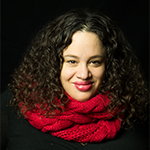My Black Jewish 7-year-old loves Kamala Harris — and I love her interfaith, blended family
For Black Jewish families like mine, the prospect of a Harris-Emhoff White House couldn’t be more thrilling

Second Gentleman Doug Emhoff and Democratic presidential candidate Vice President Kamala Harris at the Democratic National Convention in Chicago. Photo by Justin Sullivan/Getty Images
To my 7-year-old Black Jewish daughter, Vice President Kamala Harris is Taylor Swift, Beyoncé, and Bluey all rolled into one. She asked me if she could volunteer on the campaign. She begged me to let her vote and was furious to be told she had to be 18.
 “Kamala!!! I LOVE YOU! Ani Ohevet Kamala!!!” If Harris is speaking on the TV, my little girl is glued to the screen.
“Kamala!!! I LOVE YOU! Ani Ohevet Kamala!!!” If Harris is speaking on the TV, my little girl is glued to the screen.
What sparked this devotion? My daughter is deeply inspired by the idea of a Black woman president — especially one with a Jewish husband who celebrates Jewish holidays like Passover and Rosh Hashanah. The daughter of a Black Jewish father and white-presenting Ashkenazi Jewish mother, she sees herself in Harris. Our soon-to-be official Democratic nominee for president shows her what she, and other Black girls, could grow up to be. She sees a version of belonging and achievement that makes her eyes light up.
It is hard to be an interracial Jewish couple raising Jews of color. Sometimes we deal with overt racism: My Black husband still occasionally gets asked if he is lost when he walks into a Jewish event. Or if he is the cab driver.
Other days it’s microaggressions, like someone asking me where I, a white-presenting Ashkenazi woman, “got” my daughters from. I like to loudly respond — my own belly!
Once, I saw a man laughing at a poster of a Black man in our JCC. “What kind of Jew looks like this?” he asked me. I glared and answered him: My husband. My daughters.
All the time, we get asked what “the story” is. What story? We’re a Jewish family — like any other. Sometimes it’s the cheerful overcompensating that makes us feel like we don’t belong, like a congregant knocking people over to awkwardly list all of the racial justice work the synagogue does when we visit a shul. We know we are different from many Jewish families — we look different, we sometimes eat different, we use different hair products and face different problems. We are part of so many communities, and also apart from them.
But Harris and her Jewish husband, Doug Emhoff, feel just like us. Like they would understand what we grapple with. Like we could tell them about that laughing man at the JCC and they would laugh, not awkwardly, but because they know exactly what that feels like.
Life as a Black and Jewish family has gotten better, at least for us. We have been blessed to find a wonderful, welcoming, meaningful Jewish community in our synagogue, our day school, and our neighborhood. People are trying.
But to see a family like us — Jewish but different, Black, but mixed, American, but with immigrant parents — potentially elevated to the White House would be undeniably meaningful in a completely different way.
We feel connected to them. Tonight, as Harris accepts the Democratic Party’s nomination, she and Emhoff will celebrate their 10th anniversary. My husband and I just celebrated our 10th anniversary this year. It has been a difficult decade for Black Americans, immigrant Americans and Jewish Americans. We share that. We fight the same fights and navigate the same waters.
What could signal acceptance more fully than a family like ours in the White House? It brings us such joy and hope to imagine that the United States our children will grow up in will be different, better, more equal and welcoming. As Cole Emhoff, Emhoff’s son, said in a DNC video introducing his father: “We might not look like other families in the White House, but we are ready to represent all families in America.”
They are our people. Even my kid can feel it.
My husband and I are intimately acquainted with hate. He has experienced anti-Blackness. I have experienced sexism. We have been hated and harrassed for being an interracial couple. We have both experienced antisemitism, including hate crimes against our beloved synagogue. We have been shocked and educated by each other’s pain.
I have had the frightening education of watching my husband be racially profiled, and he has watched the misogyny of our peers and colleagues with disgust. Together, we yearn for liberation. We know that the American Jew is suddenly in a position far more perilous than we could have imagined when we wed 10 years ago.
Our daughters are American, Black, Jewish and female, all beautiful — and perilous — things to be. So much beauty, history, culture, love, oppression and heaviness on our tiny children’s bodies. So much for a parent to fear — and be proud of.
After the racial turmoil that marked former President Barack Obama’s time in office, I have no illusions that Harris’ election would magically end a legacy of systemic racism, or stem the rising tide of antisemitism, or break the patriarchy. I know these monsters cannot be slayed by one woman, even a president. I have watched the racism in my own community — some have even circulated a meme that claimed that Harris is Amalek, an ancient biblical nation synonymous with violence and evil — and it brings me deep pain.
That being said, I can’t help but feel that the hope in my daughter’s eyes is mirrored in my own.
Tonight, we will let her stay up late. We will snuggle up, mother and daughter with a bowl of popcorn, and watch Harris accept her party’s nomination. Daddy will hold the baby, too young to know how big a moment she is missing, asleep in his arms.
Win or lose, it’s a huge moment for little girls — especially little Black Jewish girls. My daughter will see someone who looks like her run for President. She’ll be watching a woman like her take the stage with utmost confidence and joy, and I’ll be watching my daughter — filled with the promise of what the United States could be.

















